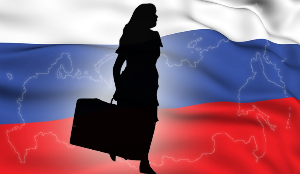Эмиграция из России: данные статистики и реальные цифры
По оценкам Росстата, Россию с 1989 по 2015 г. покинули около 4,5 млн человек. Поскольку методология учета миграционных потоков из России поменялась за последнее десятилетие, то узнать точное число уехавших не представляется возможным.
Один из авторов доклада — эксперт КГИ Александр Гребенюк — говорит, что недостаточно информации для оценки потока эмигрантов в 2010-е гг.: «По нашим данным, порядка 120 000-150 000 человек уезжают ежегодно с 2013 г. Например, в Швейцарию уезжает элита и ученые, но многие это делают тихо, не снимаясь с учета в МВД, и для российской статистики остаются неучтенными». Хотя эмиграцию во всем мире считают хуже, чем уровень миграции, добавляет он.
По данным экспертов, минимум выехавших был в 2009 г., в 2014 г. примерно подбирается к уровню 1995 г. Выросла география регионов выезда из России, при этом большинство уезжает из приграничных регионов и регионов с высокими макроэкономическими показателями. Среди регионов с наибольшим числом выехавших с 2012 по 2014 г. — Москва и область, Санкт-Петербург. Если же брать с начала 2000-х, то Москву обгоняет Омская область.
Москвичи больше остальных россиян хотят уехать из России
Наименьшая интенсивность оттока — из регионов с наименьшими показателями валового регионального продукта и с самыми высокими показателями безработицы. Причина того, что наибольший поток эмигрантов — из более благополучных в социально-экономическом отношении регионов, в том, что люди понимают, что в этих регионах, где созданы неплохие условия для развития, они уже достигли своего потолка — это касается и ученых, и предпринимателей, говорит Гребенюк: «У них есть потенциал для развития, который они уже не могут реализовать здесь. Люди из более бедных регионов все-таки нацелены на внутреннюю миграцию». У людей банально нет средств на эмиграцию.
Эмиграционный поток имеет высокие показатели качества человеческого капитала. Среди основных причин эмиграции — личные, говорят эксперты. По данным социсследований, это неудовлетворенность перспективами роста материального благосостояния, соцстатуса, личной и экономической безопасности. Доля тех, кто имеет высокие миграционные установки, колеблется от 8 до 23% согласно социсследованиям, наиболее высокие показатели среди молодых людей и людей среднего возраста с высшим образованием, проживающих в крупных городах.
Также среди причин, подталкивающих к отъезду, — нестабильные экономические условия ведения бизнеса, отсутствие конкуренции, коррумпированность, возрастающие риски личной и предпринимательской безопасности, низкие бюджетные расходы на науку и образование, низкая зарплата. Среди социально-политических причин — сочувствие оппозиционным взглядам, опасность подвергнуться преследованию из-за своей позиции, слабость институтов, недоверие к правоохранительной и судебной системе. Среди притягивающих внешних факторов — спрос на высококвалифицированных работников, возможность улучшить качество жизни, благоприятный предпринимательский климат и др. «Поток эмигрантов уменьшится, если вырастет уровень экономического благосостояния, то есть нужно снимать основной выталкивающий фактор — экономический. Меры государственного управления не будут работать, нужен структурный подход — менять условия», — говорит Гребенюк.
Эмиграция предпринимателей подрывает экономику России
По данным на 2014 г., наиболее высокие показатели человеческого капитала имеет поток россиян в Канаду (42% имели высшее образование), потом в США (38%), Израиль (34%), Германию (31%). Для сравнения: доля лиц, имеющих высшее образование, среди иммигрировавших в Российскую Федерацию — 14%. При этом чаще всего на Запад уезжают ученые, студенты, предприниматели, постепенно растет прослойка рантье, которая вывозит денежные активы и живет на дивиденды, — это все чаще бывшие чиновники, семьи политической, финансовой и бюрократической элит, говорится в докладе.
«Мозги ценятся за рубежом, большое число тех, кто уезжает, — это недавние выпускники университетов, и самых образованных выявляют еще на стадии обучения. Но если в России не создавать привлекательные условия, то всегда найдутся интересанты, которые будут заинтересованы в умных людях из России», — говорит председатель комитета Госдумы по труду Ярослав Нилов (ЛДПР). Эмиграция всегда была, вопрос в интенсивности, говорит он: «Нужно создавать в России условия,чтобы ученые были востребованы здесь и могли реализовывать свои разработки, чтобы государство было в них заинтересовано. Предпринимателям создавать соответствующий бизнес-климат».

















